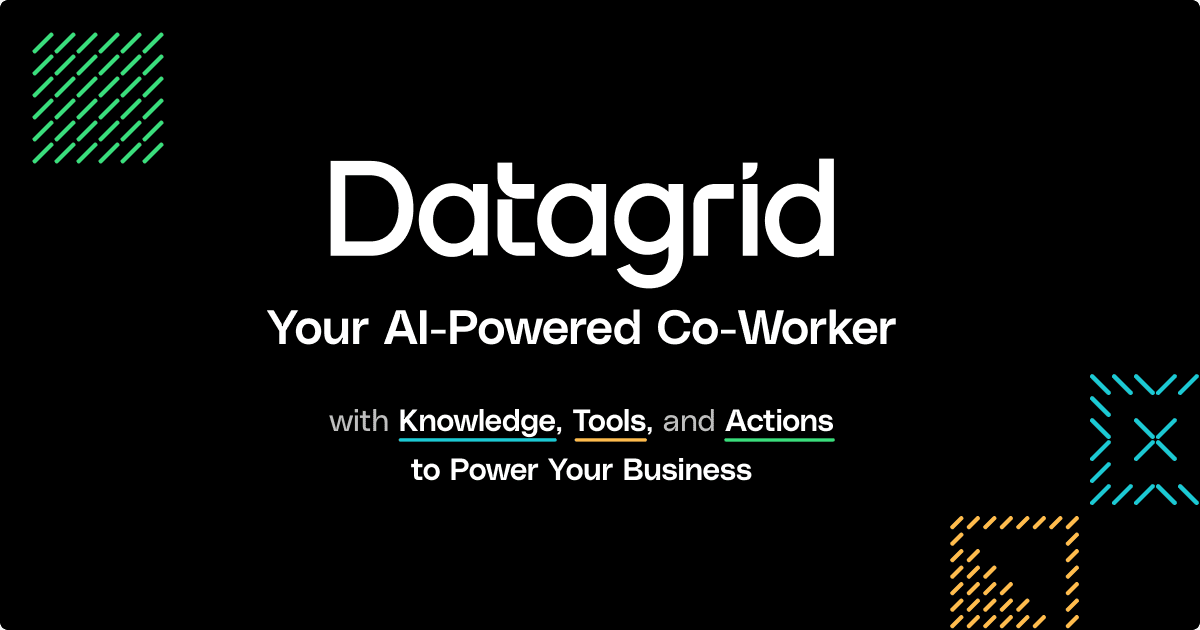Discover how AI agents automate transaction timeline coordination and tracking for coordinators. Streamline deals.
Juggling inspection windows, contingency removals, lender conditions and closing appointments across twenty or thirty active deals means tracking hundreds of interdependent deadlines without automated data processing. One missed date, the earnest-money deadline expires, and a chain of closings collapses.
You shouldn't have to live in your inbox to keep deals alive. Agentic AI platforms now handle the timeline math—extracting contract dates, recalculating dependencies and nudging every stakeholder automatically.
This playbook shows you how Datagrid's AI agents turn timeline chaos into predictable momentum.
What is Transaction Timeline Coordination and Tracking?
Real estate coordinators spend 60% of their day chasing deadline updates across scattered spreadsheets, email threads, and phone calls. Contract deadlines live in one system, inspection schedules in another, and loan progress gets tracked through text messages with lenders.
Transaction timeline coordination eliminates this chaos by systematically managing every deadline, milestone, and dependency from contract to close.
You're tracking earnest money deposits, contingency removals, inspection windows, loan commitments, and closing preparations across 7–10 stakeholders per deal—all while managing dozens of concurrent transactions.
Comprehensive coordination covers contract deadline management, milestone tracking, stakeholder communication, document collection and verification, inspection scheduling, and financing progress monitoring.
The challenge isn't understanding what needs tracking—it's maintaining real-time visibility when each transaction follows unique timelines based on contract terms, market conditions, and lender requirements.
Today's coordinators serve as the central data hub connecting agents, buyers, sellers, lenders, inspectors, and attorneys. Manual tracking breaks down when you're managing 20+ active deals, each with interdependent deadlines where one delay cascades through multiple milestones.
Successful coordinators now rely on integrated platforms that sync calendars, auto-populate critical dates, and maintain comprehensive transaction archives rather than paper checklists and sticky note systems.
Why Transaction Timeline Coordination Excellence is Critical for Real Estate Transaction Success
Effective timeline management prevents costly errors and keeps all stakeholders aligned throughout the transaction process. Missing critical deadlines not only causes deals to collapse but also damages your reputation with clients and referral partners.
When transactions close on time, every participant—from lenders to inspectors—can schedule resources efficiently, creating a positive feedback loop of professional reliability and client satisfaction.
Transaction breakdowns create financial consequences far beyond the immediate deal. When earnest money deadlines are missed, buyers may lose their deposit and sellers face extended days-on-market that jeopardize their next purchase.
Brokerages face increased E&O liability when deadlines slip, as timeline-related disputes account for nearly 18% of real estate litigation according to industry risk management studies.
The competitive advantage of superior timeline management cannot be overstated in today's market. Real estate teams with automated deadline tracking close 22% more transactions per agent compared to those relying on manual systems.
This efficiency edge translates directly to financial outcomes—coordinators using integrated timeline platforms report 30% higher client retention rates and significantly more referral business from satisfied participants who experienced smooth, predictable closings.
Common Time Sinks in Timeline Management
Manual deadline tracking consumes hours of productive time that could be spent nurturing client relationships and securing new business.
Transaction coordinators waste 15+ hours weekly recalculating contingency dates, sending reminder emails, and documenting deadline extensions in multiple systems.
Multi-Party Communication and Stakeholder Coordination
Seven to ten stakeholders per deal means juggling different communication channels—phone, text, portal, email. You spend hours chasing signatures, confirming inspection times, relaying schedule changes.
When one party goes silent, progress stalls for everyone. Rising deal volume amplifies these communication breakdowns.
Without real-time updates syncing all parties to the same timeline data, confusion and finger-pointing surface when deadlines shift mid-deal.
Document Management and Verification Workflows
From purchase contracts to closing disclosures, documents arrive through scans, photos, and courier deliveries in no particular order. A single missing initial halts funding, yet document volume overwhelms even experienced coordinators.
Version control becomes critical: which inspection addendum is final? Did the seller sign page three? Manual tracking rarely captures document status in real time, so deficiencies surface only when underwriters flag them—often days before settlement.
Automated document intake and verification creates the audit trail that prevents regulatory penalties and post-closing disputes.
Datagrid for Real Estate Professionals
Moving beyond manual deadline tracking, modern real estate teams need intelligent systems that handle the complexity automatically.
Datagrid's AI agents operate as your digital operations team, eliminating late-night calendar calculations and status-chasing that derail closings.
Datagrid transforms real estate coordination with:
- Automated contract processing that extracts key dates in minutes instead of hours
- Intelligent timeline recalculation when any deadline shifts
- Multi-channel communication management based on stakeholder preferences
- Real-time document verification that flags missing signatures instantly
- Predictive analytics that identify at-risk deals before deadlines slip
- Seamless integration with your existing CRM and transaction systems
Datagrid's first AI agent processes uploaded purchase contracts in two minutes—not the twenty to thirty minutes coordinators spend on manual review. It identifies every contingency, deposit date, and inspection window, building a linked timeline visible on a single screen.
When inspection dates shift, the system automatically recalculates downstream events and alerts affected parties before delays cascade. The timeline dashboard keeps you one glance away from every active file's health.
Communication bottlenecks disappear through centralized message management. No more hunting through separate email threads to confirm whether appraisers received updated addendums.
The results are measurable: fewer missed deadlines, dramatically less manual follow-up, and capacity to manage more deals without expanding headcount. AI agents handle routine operations so you focus on relationships, negotiation strategy, and the decisions that win deals.
Simplify Real Estate Tasks with Datagrid's Agentic AI
The coordination challenges outlined above—from deadline tracking to stakeholder communication—represent just the beginning of what intelligent automation can solve. Deal coordinators spend 15+ hours weekly tracking deadlines across spreadsheets, emails, and sticky notes.
One missed inspection deadline kills the deal. Datagrid's AI agents extract contract dates automatically, monitor 20+ deadlines per deal, and alert stakeholders 48 hours before critical milestones.
Real estate teams often cut coordination time and improve closing rates thanks to workflow automation and reduced manual tracking gaps, though exact impact percentages vary and may depend on the specific systems used. Ready to eliminate deadline stress?
Create your free Datagrid account and automate timeline coordination across unlimited deals.













